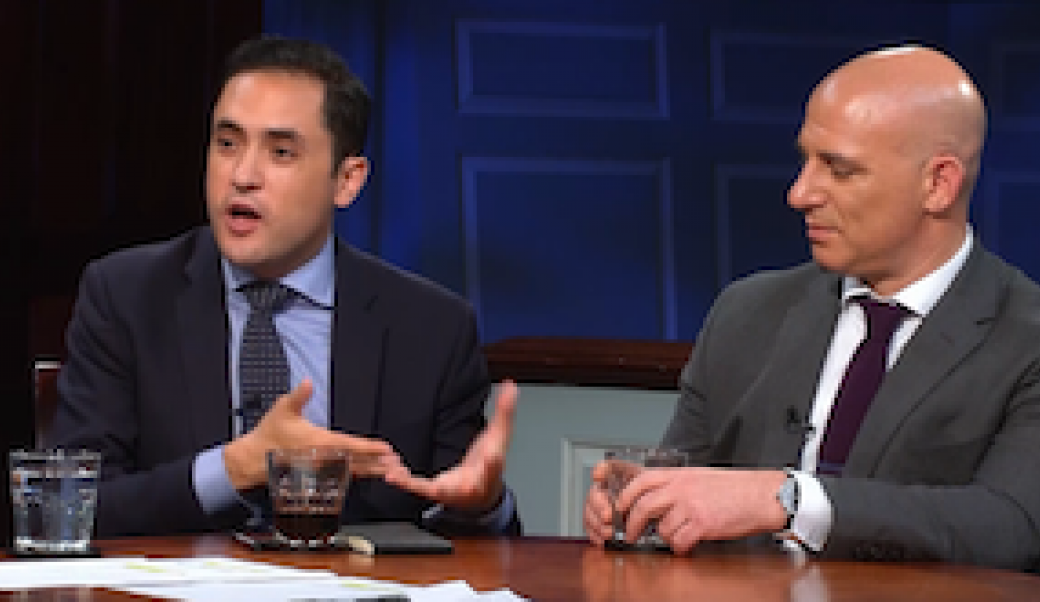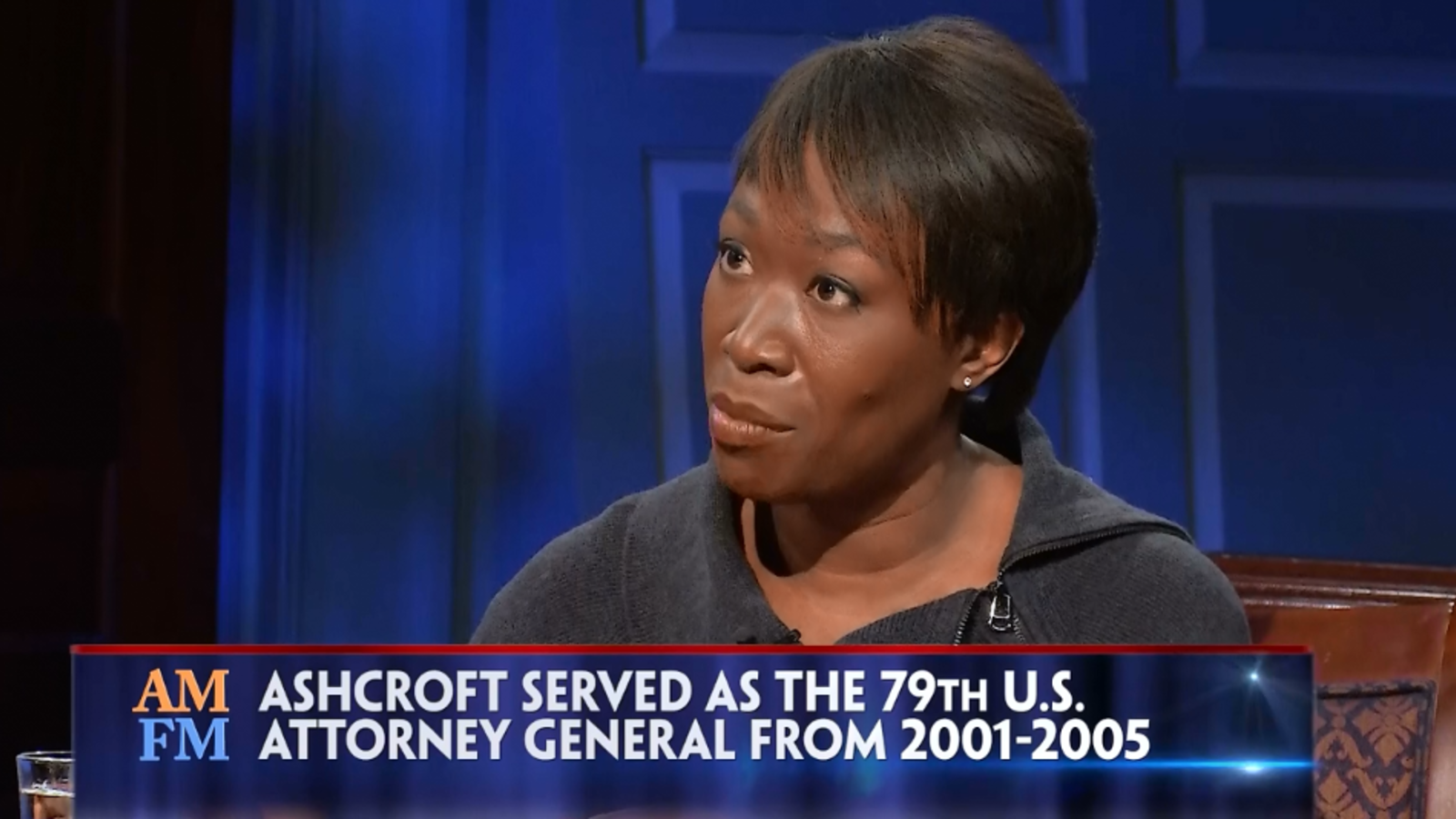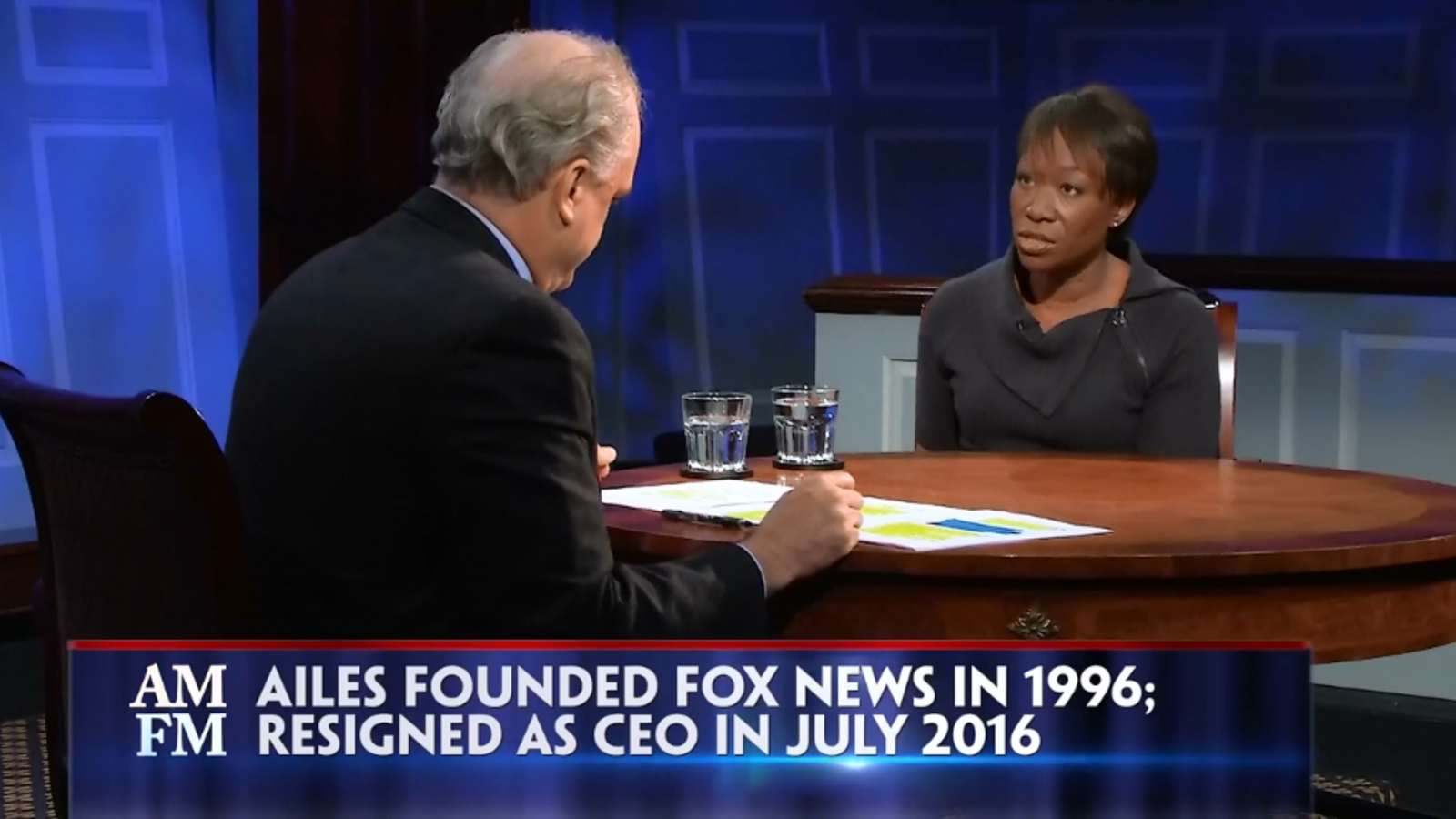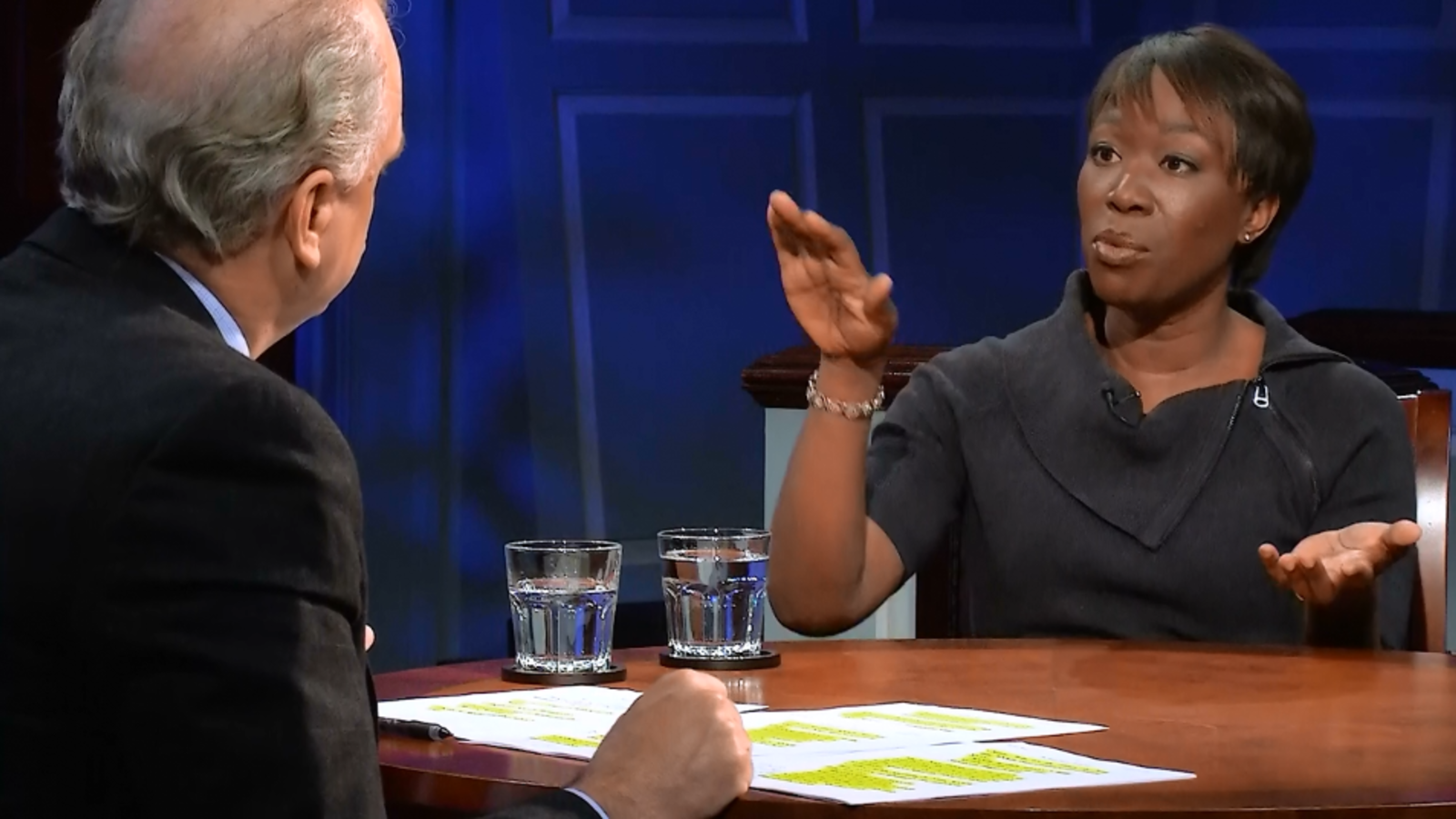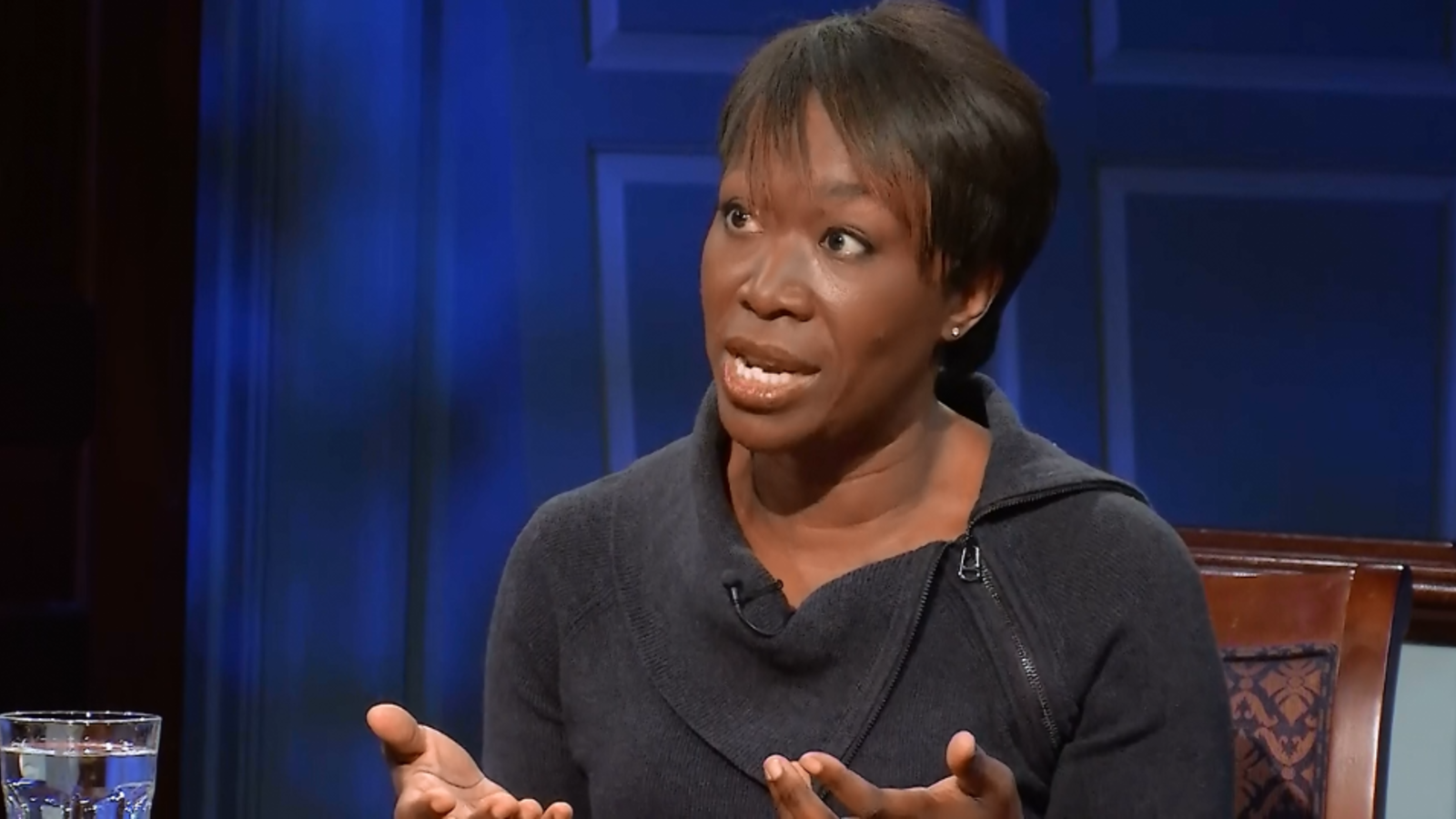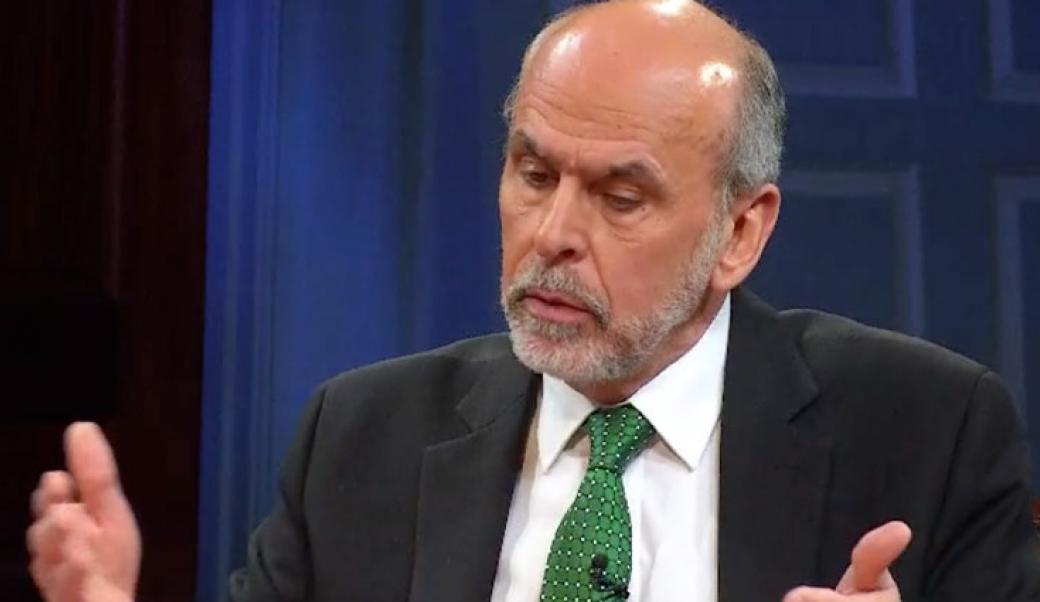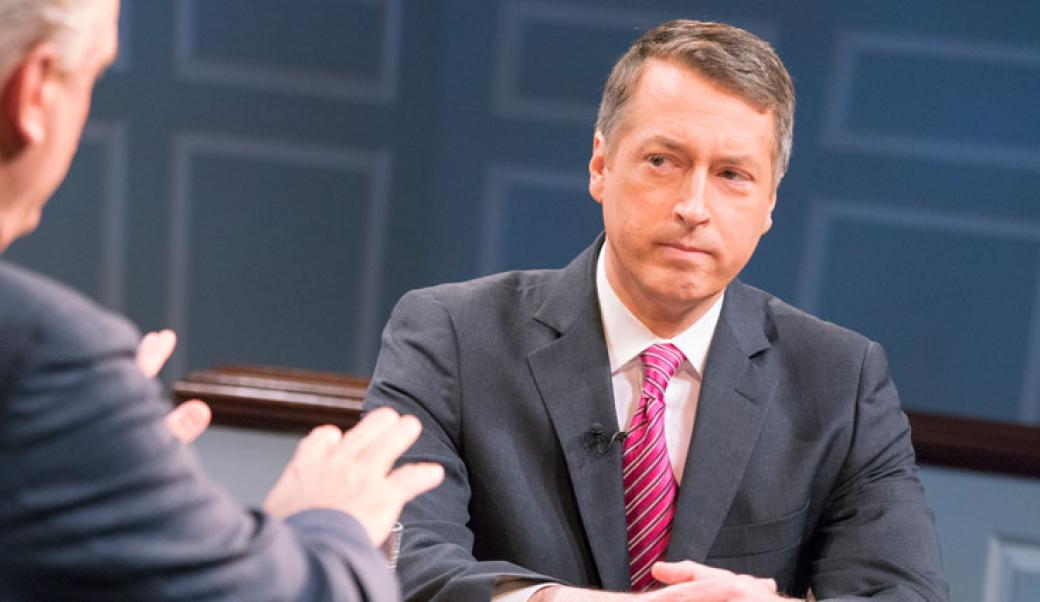About this episode
February 07, 2018
Joy-Ann Reid
Hosted by Douglas Blackmon
Media and the Press
The White House - Media War
Transcript
04:41 Doug Blackmon: Welcome back to American Forum. I’m Doug Blackmon. The importance of a free press has been a pillar of American democracy since the founding of our republic. Our third president, Thomas Jefferson, once wrote, “Where the press is free and every man able to read, all is safe.” His predecessor in the White House, John Adams, said, “Liberty of the press is essential to the security of the state.” Two hundred years and 42 presidents later, it’s not clear that the current occupant of the White House would entirely agree. President Donald Trump has seemed to suggest that he may be the only person in the country who can be reliably believed by the people. According to the president, almost every mainstream media outlet other than Fox News produces mostly “fake news” and conspire to vilify him and his administration by lying to the American people. There’s no doubt that during the 2016 campaign primaries the more sympathetic portrayal of President Trump by conservative Fox News was a major ingredient in his electoral success. Somewhat ironically, though, President Trump’s criticism of more mainstream media outlets, especially CNN and what he calls the “failing” New York Times, appeared to alter the competitive balance among major news organizations and actually benefited more liberal or neutral media operations. Fox News’s long reign as the highest-rated cable network grew shaky. Circulation surged at the Times and the Washington Post. Viewer contributions to PBS and National Public Radio hit record levels. MSNBC, the network that vigorously embraced a liberal critique of President Trump, had its best year ever in 2017 and early this year topped the viewership of Fox News.
So what exactly is the deeper threat in President Trump’s charges against the media and his administration’s use, to quote Senior White House Counselor Kellyanne Conway, of “alternative facts.” Some say the President’s rhetoric borders on repression, especially when he has suggested making it easier to sue news outlets. Recently, Republican US Senator Jeff Flake criticized the president for evoking the words of Soviet dictator Joseph Stalin when he called news media “the enemy of the American people.” Trump’s attacks also come at a time when journalists around the world face increasing threats of violence and imprisonment. The Committee to Protect Journalists reports a record number of reporters were jailed in 2017 and blamed President Trump’s nationalist rhetoric and attacks on the press for emboldening oppressive leaders all around the world. Chillingly, after a video of a modern-day slave auction in Libya was released, a Libyan broadcaster labeled the story “fake news.” So how do we parse out the real from alternative facts and whether there is genuine danger to our democracy from anyone’s overheated rhetoric? How can news outlets provide accurate yet diverse analysis in the face of declining public trust in all media? Discussing these items with us today is Joy-Ann Reid, the host of MSNBC’s AM Joy, a political talk show airing weekend mornings and one of the fastest-growing news programs on television. She also writes for the Daily Beast and has produced two books about Barack Obama. In 2015, she authored Fracture: Barack Obama, the Clintons, and the Racial Divide, examining race relations leading up to and surrounding the election of the country’s first black president. Last year, she co-edited a collection of speeches by President Obama titled We Are the Change We Seek. Thank you for being here.
Joy-Ann Reid: Thanks, Doug. It’s great to be here.
04:07 Blackmon: How much of a danger is Donald Trump’s rhetoric, uh, now, and how much of the worry about his rhetoric is perhaps itself a little bit overheated?
Reid: Yeah. I mean, I think that Donald Trump, um, because of the—sort of the strength and durability of the First Amendment, is not a threat to sort of ending the free press in America. I think that kind of a critique would be overheated, but there are a few ways in which he really has posed a danger. You mentioned one of them in that his rhetoric about fake news, because of the influence of the American president in general, sort of over the way that the world talks about liberty, you know, just historically, he has emboldened people like Duterte in the Philippines, um, you know, dictators around the world to use his same style and rhetoric on their own populations to deny atrocities that are happening in their own country. So it has lowered in that way America’s moral authority, um, on things like liberty, on things like freedom. I think in the other few senses, number one, there’s the actual physical threat to journalists. You know, during the campaign you had people who would wear this T-shirt that said “Rope, Tree, Journalist,” essentially accusing anyone who was in the media who was not being kind to Donald Trump or reporting on him positively—um, essentially, “You deserve to die or be lynched.” I, myself, was confronted by people in MAGA hats in Cleveland covering the Republican convention. I remember one grandfather got up from his table with his grand—with what appeared to be his grandkids and walked over to our table and berated us, “Shame on you. You’re the fake media. You’re—” you know, essentially accusing us of being unfair to Donald Trump. So the hostility, um, that he created against the media, putting them in a pen and calling for his supporters to mock members of the—the press pool produced real death threats for people. So I think he can be a threat to the individual journalists. And I think the third way that he is a threat is that he’s serving to undermine a sort of general trust in the accuracy and honesty of the media. You’ve had conservative activists try to plant false stories to bait, you know, reporters into reporting them so they could get people fired and sort of undermining the overall trust. And we recently saw an incident in Hawaii where we saw how much we still need to actually trust the media. You had a report go out from the state defense authorities in Hawaii. Everyone got these alerts in their email and on their phone saying that a missile had been launched. There was real panic for about 38 minutes, um, and in that kind of an instance you need to have an individual—an independent arbiter of what is true, especially in situations where you could have public panic. So you still do need to have a media that’s generally trusted.
06:39 Blackmon: What do you think of the idea that, uh—that the backdrop to all of this or the context to all of the animosity that has developed, that a part of it is rooted in that, let’s say, the man who came up to you with his grandkids or whoever it was and—and were assaulting you—I’m immediately imagining cousins of mine out in the country in north Louisiana, uh, who I think might have shared similar sorts of views, hopefully wouldn’t have been quite as rude about it, but this sense that there was a population of Americans who felt like “the media” had been insulting them at some level for a very long time, uh, and that somehow Donald Trump came along and said, “It’s OK to be mad about that. It’s OK to—and you were—you’ve been right to think that they were—that they were after you, in a sense. Do you buy that at all?
Reid: No, I absolutely do. I think on the one hand, you know, Donald Trump gets a lot, I think too much credit, for having created this—this thing that he took advantage of. I think it’s—you know, before Donald Trump was telling that person that’s out there in the, you know—outside of the New York to DC corridor, outside of LA, you know, that, “You’re right,” Rush Limbaugh was doing that. Roger Ailes created Fox News simply to do that.
FACTOID: Ailes founded Fox News in 1996; resigned as CEO in July 2016
That is the whole purpose of Fox News, is to tell, you know, that cousin of yours out there in Ohio somewhere, “No, you’re right. Your grievances are actually accurate. They are out to get you.” Um, and I think that there’s a long history of it. I—I do this a lot in lectures and talk about the sort of history of the idea of media bias. It goes all the way back to the change in tone of the way lynchings were covered. You know, there was a time when even mainstream newspapers would cover lynching in this matter-of-fact way always presuming the guilt of the man who was lynched, um—
08:16 Blackmon: Yeah, the black guy got—justice was served. Right. Yes.
Reid: —“black miscreant,” exactly, “miscreant hanged for grievous rape of—of innocent young woman, um, meets his death at fiery flame,” you know. And it was very graphic, but it was always presuming the guilt of the—of the lynched person. Um, and you had Ida B. Wells and other black journalists really pushing hard and insisting that that is not the way you should cover an atrocity and that you should not presume the guilt of a lynched person.
FACTOID: Wells was an anti-lynching activist and co-founder of the NAACP
And over time, that ethos of the way that the atrocities against black people should be covered really did sink in. And it just seems that all of the media was converging in a liberal direction.
To a certain population, that’s what Roger Ailes and that’s what Rush Limbaugh were responding to. That was the sort of market need, uh, you know, “Build a better mousetrap,” that they both caught on to and figured out would work. It was taking the Lee Atwater of empathy, right, for the person who is villainized and translating it into news. So I think right now what you have is a big population of Americans who feel that the New York Times and the Washington Post and the mainstream press is by default biased against conservative per—conservative ideas, conservative people, and, quite frankly, white people, right, and that they’re always sympathetic to the minority, always sympathetic to the Muslim, always sympathetic to the woman, always sympathetic to the migrant. And they found a home in Fox News, a place where it’s all reversed. “The black person really is trying to take your money out of your pocket because they want to lay around on welfare. The immigrant really is a criminal. The Muslim really is coming to this country just to blow up, uh, buildings and be a terrorist.” And so that inverted worldview is very attractive, and that’s why Fox News is so durable. It’s why no one can take their audience. You know, we’re growing at MSNBC. We’re not growing by taking their audience. Their audience is rock-solid. That talk radio audience is rock solid for Limbaugh and Glenn Beck, and Donald Trump, because he’s an entrepreneur, figured out that audience can also be a political audience. Pat Buchanan tried it. He just didn’t have a big enough voice. He didn’t have the charisma to pull it off. George Wallace had the charisma. He just didn’t—I think he was sort of out of his time, right? He couldn’t take that all the way mainstream, but he definitely had a very similar voice to Donald Trump, and he took it a certain distance. Donald Trump took it all the way to the White House.
10:27 Blackmon: And he’s also someone who really understands, uh—and some people in New York City, in particular, might not like to hear this, but I think he understands that kind of unique, blue-collar New Yorker dynamic—
Reid: He does. Yeah, Donald Trump really is the physical embodiment of a sort of casual racism of New York. New York is a very particular kind of place. All the boroughs are very—are very different. In Queens, which is where Archie Bunker was based, right—Donald Trump is sort of Archie Bunker sans the charm and the sort of redemptive qualities.
10:53 Blackmon: And plus a lot of money. (laughs)
Reid: And plus a lot more money, right? But he was born, you know, and raised in Queens, which means that he can always look out over the Hu—over the river and see the—the real rich people, the people who had the re—the money and the respect, the sort of well-heeled Manhattanite who looked down on the Queens rich. He’s considered new money, right? His grandfather comes here in the late 1800s with no money at 16 years old, prospecting for gold, fails at that, running prostitutes, finally makes his little fortune, you know, by buying a little real estate and selling it. Can’t go back because he didn’t register for the draft and wasn’t willing to register for the military in Bavaria but came here speaking only German, right? So it’s sort of a very New York story. His mother comes here from Scotland, be—becomes a domestic, and then finally they marry. They buy a little house, and they get a couple more houses and a couple more, and suddenly, uh, Trump’s father, Fred Trump, has a little empire, right, a little empire in Queens, which is different from a little empire in Manhattan.
11:48 Blackmon: Yeah.
Reid: You know, and I think there’s a—there’s an envy of the Manhattanites that you feel in the Queens rich where it’s like, “I’ve got the money, but I don’t—I’m not invited to the parties. You know, I’ve got the wealth, but I don’t have the lineage.” Uh, and Donald Trump has, throughout his career, been kind of rejected by that crowd, whether it was in Palm Beach, where he buys, you know, Margaret Merriweather Post’s beautiful mansion and turns it into a tawdry club because he has to, because he’s losing his fortune. He’s bankrupt, and he tells the bank, “Let me keep this house. I’ll turn a profit.” That’s what he did, and so that’s sort of tawdry to the other people in Palm Beach, but it’s the way he kept his money. You know, and he’s gone bankrupt over and over and over again, but the New York real estate industry is grimy, and so he’s kind of grimy.
FACTOID: Six Trump companies have filed for chapter 11 bankruptcy
Um, his father, you know, gets arrested at a Klan meeting, so he’s sort of this, you know, sort of core racist son of immigrants, um, but they’re operating in this very multiethnic environment. Queens has everything, Africans, Jamaicans, Haitians. It has a little bit of everybody, so Trump knows how to move around black people, move around brown people, sometimes even move with, you know, black and brown people, associate with them. There’s a story that one of his executives who’s white tells about a chief financial sort of person, a high-level black finance guy that’s working in the Trump Organization who—Trump is complaining about him. He doesn’t like his performance, and he says to this other executive who’s white, “You know, I don’t really like black people counting my money.”
13:09 Blackmon: Yeah.
Reid: “I like the people who count my money to have yarmulkes on,” totally—
Blackmon: Yeah, he likes—likes Jews, not necessarily blacks.
Reid: —“I want the Jews to count my money,” so that’s like a doubly offensive thing to say. So it’s Trump being racist, but he did hire that guy, so Trump has a way of being both friendly to Don King and to rich black people, and letting black people and even rappers in Mar-a-Lago, which incenses the sort of [inaudible - 14:31:44] rich but also racist Palm Beach millionaires, multimillionaires, and at the same time performing racism, too. So he is this really complex guy, and a lot of Americans can relate to that—
Blackmon: Sure.
Reid: —the sometimes casual racists.
13:45 Blackmon: Yeah, I think—and I do think that we’re actually—I mean, on the one hand, I do want to say, um, so that we don’t have just totally an avalanche onto the president here that he certainly, if he were sitting here, uh—well, he probably would have stormed out by now, but the—
Reid: Oh, no, we’re talking about him. He’d love it.
13:56 Blackmon: Well, that’s true. (laughter) But if—but if he were here, he would say, as he said just the other day, uh, “No, I’m the least racist person you would ever meet or you would ever interview,” and he would insist that, and he did over the course of the campaign at the same time that he said these coarse and offensive things about Mexican immigrants and—and the 5th District of Georgia, where I live, actually, um, being on fire—
FACTOID: In June 2015, Trump said Mexico sending “rapists” to U.S.
Reid: Yeah.
Blackmon: —uh, and insulting John Lewis. But he also said— and I think, probably, in his own way of thinking as you’ve just described it—I think he said somewhat earnestly, “I’m going to be the president of all people, and I actually want everybody to have success,” and that includes black people. So it is that—that—that curious combination of things that also would suggest to a person that, “I’ve inherited a bunch of apartment buildings or I’m managing a bunch of apartment buildings that my dad bought and built up and that it’s not a contradiction for—uh, because I am willing to hire black people to work for me, I’m willing to—I’m not a member of the Klan. I’m not out to do harm to black people, but it’s actually not a contradiction of that—that nonracist perspective for me to also realize that it seems like black people renting my apartments, uh, is a problem, because the white people don’t want to be there, or, you know, whatever I think those issues are going to be.
FACTOID: 1973 DOJ suit alleged Trump bias against prospective black tenants
And so it’s OK for me to kind of try to keep black people out of the family’s apartment buildings. But at the same time, if I’m not calling somebody a bad name or I’m not refusing to hire them, that keeps me clean on this. I’m just being practical—”
Reid: Right.
Blackmon: “—but not—but certainly not violating the law, you know.”
Reid: Well, I mean, I think Donald—I mean, every human being is complex, right? I mean, Lincoln was racist. Do you know what I mean? Like, you can be—
15:25 Blackmon: I mean, everybody in America was racist until relatively recent times.
Reid: Abs—exactly. And Truman, you know, grew up using the n-word on a casual basis. I think he might have done it right up until the White House, but he still managed to do good policy. I mean, Lyndon Johnson right up until ’57 is—is, you know, voting in a racist way, and then he flips and becomes, like, the most helpful president to black America, you know, up until probably Barack Obama, right?
FACTOID: Civil Rights Act of 1964 protected race, color, religion, sex, and origin
So, I mean, it’s possible for people to have a complex nature. It’s possible for Trump to hang around P. Diddy and also be racist, you know, and I think saying, “I’m the least racist person you ever met,” only ra—people who are racist say that. (laughs) It’s the—that’s like saying, “I have black friends. My—some of my best friends are.” It’s a weird thing to say, but Donald Trump is of a certain generation where in his own mind I’m sure none of this is a contradiction. The problem with Donald Trump is that the casual racism that’s internal, that might just be a part of his 71-year-old manhood is also being translated into real harmful racist policy and that he’s not just racist inside. He’s racist outside. And so what you have is a president who’s trying to enact immigration policy that deliberately targets brown people, who’s trying to enact, uh, in—through his Attorney General criminal justice policies that roll back a lot of the gains that we saw under Eric Holder to try to free black people from this extra oppressive yoke of the criminal justice system. He seems—he wants to recriminalize black people. Um, Donald Trump’s actual policies being racist is much worse than him being racist. Donald Trump himself being racist is just a humiliation on the presidency. He’s casting a pall on the office because people who had racist views—like Richard Nixon, even—knew better than to be that way in public. Without the tapes, we wouldn’t have the—the racist Nixon as a thing that we knew because he knew to perform in public a kind of dignified presidency. Donald Trump has thrown out the dignified presidency. He’s put Archie Bunker in the Oval Office, behaving the way he did on TV. That’s the problem with Donald Trump, is that both, you know, the dignified and the efficient are—are problematic, the dignified in that he does not know how to perform the sort of redemptive role or the sort of—the avatar of the presidency that makes America fit its founding creed even if the person doesn’t believe in it. They always performed it. Even Jefferson, slave-owner, performed it, right? Trump won’t even—he will not do the dignified, and on the side of the efficient he is—he is degrading, uh, the people of color who are also citizens who he also serves. So that’s, I think—that’s my big critique of Donald Trump.
17:51 Blackmon: But what I wonder about is, uh, whether this new prevailing wisdom this prevailing view that the black guy must have done the bad thing, and then, later, that the—that the bad Southerners must—are clearly wrong, uh, in—in attacking Civil Rights workers. And if we have a new conventional wisdom that says, “Donald Trump is a danger and a liar, and, uh—and we’ve got to call him out, and that’s our duty to the society,” uh, and so then Donald Trump finally goes away—one way or another, he will.
Reid: Yeah.
Blackmon: You know, he’ll—what do we do then? You know, how—how do we establish that whoever the—whoever comes next, Democrat or Republican—
Reid: Yeah.
Blackmon: —how do we get the people to understand that—that you or the rest of MSNBC or—
Reid: Yeah.
Blackmon: —well, actually, now we’re going to try to revert back to something more, like, straight.
Reid: (laughs) Right. Yeah. You know, it’s funny. I remember writing—and I’m trying to—I wish I could find where I wrote it, but I remember writing and thinking back during the George W. Bush era, and I was pretty strongly—I was strongly enough opposed to George W. Bush that I quit news for a while to go and work for a campaign to try to oust him in 2004.
Blackmon: Which is the sort of thing that at one time—
Reid: You couldn’t ever get back in media.
Blackmon: —you would have never been able to come back. Yeah. Yeah, exactly, so—
Reid: Ever, ever, no, it would have been done, and I actually lost my column doing that. You know, the Miami Herald said, “You can’t write for us, you know, now that you’re working on this campaign.” I’m like, “Wait a minute. David Gergen, what about all of these—” and they’re like, “Well, we don’t do that here.” So, you know, I had to give up my cherished Miami Herald column to work on this campaign because there used to be this really bright line. And I was working on the op-ed page as a freelance op-ed writer, but that was a bridge too far to be working in politics. That’s just in 2004. It’s not that long ago, you know, but I think—I remember at the time saying to myself, as much as I oppose everything about George W. Bush, at some point when you see the seesaw back and forth after Nixon’s impeachment of Republican wait—laying in wait to impeach the next Democratic president—and, essentially, Republicans admitting, “It’s payback time,” that, “As soon as you get one, we’re going to take him out. Um, we’re going to pay you back for having turned against the Vietnam War, which we could have won,” Pat Buchanan would say, “if you liberals hadn’t turned against the president and turned against the idea of the war, that—you know, that you all are destroying America.” And, you know, people spoiling for Clinton’s impeachment the first year, as soon as he got in, you know. People were talking about impeaching Obama as soon as he got in. You had people like Trey Gowdy saying they were going to have “pre-impeachment” hearings because they were assuming Hillary Clinton was going to win, laying in wait to impeach any president of the other side. And I remember in ’04 saying in writing, “At some point, this seesaw has to end, and we’re going to have to get back to a general respect for the President of the United States where the president isn’t just the Republican president or the Democratic president but that everyone broadly respects them.” I think Ronald Reagan generally had that as much as, you know, even—my mother despised Ronald Reagan. We had a general respect for him. You know, when the Challenger happened, I didn’t turn off the TV and refuse to hear him say, “They slipped the surly bonds of earth.” I was willing to listen to him, but I think we’ve gotten to a point where it’s so partisan, where there’s no way a Democratic president can get the respect of most Republicans, and there’s no way that Republicans will respect a Democratic president.
FACTOID: In 2016, 55% of Democrats said they feared the Republican Party
There’s a poll that Pew has that they’ve been doing forever that says, “Do you want the role of the press to be adversarial, or do you think the press being adversarial stops presidents from doing their job?” Literally, that poll flips depending on whether your party has the White House. So when a Republican is in the White House, Republicans say the press prevents the president from doing his job, but when a Democrat is in the White House Republicans say, “We want him to be adversarial,” and vice versa for Democrats. I don’t know how you get back from that. I think we’ve become tribal. I honestly think we’re sort of two countries kind of forced to live together at this point, and each country gets a president every eight years. And the other side goes to war with that country. And I don’t really know—the media certainly can’t bring us back together, absolutely not.
21:32 Blackmon: If Bob Mueller and his team and the grand jury that’s hearing evidence related to Russia and the, uh—and—and perhaps President Trump’s past business practices, if that process leads to a conclusion that some of this maybe was messier than it should have been but, in the end, uh, there was no meaningful, uh, conspiracy between Russians and the Trump campaign to affect the outcome of the election—but, one way or another, if Bob Mueller were to come out and say the same thing that was said about Hillary Clinton initially on email-gate, “No charges, no basis for prosecution,” would you be able to go on the air and say, “OK, we got our answer. We need to accept it”?
Reid: Absolutely, because the thing is, it also depends on the character of the person, right? James Comey during the Ashcroft affair—if you remember, he raced to Ashcroft’s bedside.
FACTOID: Ashcroft served as the 79th U.S. attorney general from 2001-2005
Ashcroft, I think his appendix had burst, and the Bush Administration wanted him—wanted to sign—wanted him to sign off on warrantless wiretapping, which Ashcroft objected to. And you had Comey essentially racing to his bedside and saying, “You can’t take a man who’s laying sick in bed and try to manipulate him into signing something that you want when the legality of this is deeply in question,” and Comey was really heroic in that instance. And you had people who really thought of him as a hero—I remember the “Comey is my homie” sort of memes that were out there—flip on him and say that he was, you know, a villain because of, you know, I think some mistaken and misguided comments about Black Lives Matter and the “Ferguson effect.” I think he was wrong about that, but I don’t think that made him a bad man.
FACTOID: Comey feared viral police videos made officers less willing to act
And then, you turn to the fact that he really did influence the election in the end for whatever reason in making a huge mistake on something I—we—we would all love to have FBI directors and FBI ag—officials tell us things about investigations. They never do. They are so tight-lipped. But whatever—for whatever reason, his sort of personal flaws, you know, or maybe his—the pressure on him or fears it would leak, he comes out, and he impacts an American election 11 days before. Now, all of that is the totality of—of his sort of public record, but he also had him resisting a president who’s asking him to take a personal loyalty oath. Now, given all that, is Jim Comey a good man or a bad man, someone you believe or someone you don’t? I think on balance I look at all that history, even with the things I’m deeply—I find deeply problematic, the “Ferguson effect” stuff and what he did with Hillary Clinton. But on balance, I think my—just looking at his record, he seems like a trustworthy man, so I have to trust sort of him in his overall judgment, right? So when he says, “Hillary Clinton is not a criminal,” it’s good enough for me. Maybe it’s because I, you know—is that because that’s the conclusion I wanted? I don’t know, but I know what he did 11 days out, I thought, was wrong. But I don’t then conclude that Comey should be thrown away, right?
I think with Bob Mueller you have no such ambivalence. Bob Mueller is probably the most straitlaced, straight-ahead. If he had any desire to be president, I think he could be president tomorrow. I think he could easily win in 2020 because he’s so straitlaced. He’s sort of like a 1940s gumshoe-type character. I mean, if this was a Frank Capra movie, he’d be the hero of the movie. He’d be played by, like, Cagney or something. You know what I mean? Like, he’s that guy, and there’s nothing in his history to suggest he’s a liar, he’s a partisan. I know he’s a Republican, but he doesn’t seem to be a partisan Republican. If he comes out and he says, “There’s been no collusion,” The questions then become, “Did Donald Trump try to cover that up, obstruction of justice, and are there other things in his finances that suggest money laundering, tax evasion?” which is the most likely outcome. So what we’ve been trying to tell our audience is, “If he says all the rest of it, that there was financial chicanery, that there may have been some obstruction of justice somewhere, but there is no collusion, do you throw out what he said?” No, of course not. He’s done a very careful investigation. We need to believe the outcome.
24”58 Blackmon: Joy-Ann Reid, thanks for being here.
Reid: Thank you.
Blackmon: We here at American Forum strive to provide viewers with nonpartisan and honest conversations about the biggest issues facing our country. We’d like to know what you think about how you try to get a diet of diverse news and analysis, so share your thoughts with me via the email on your screen or on Twitter, @douglasblackmon. You can follow Joy-Ann at her Twitter handle, @joyannreid. Lastly, a note that this is one of American Forum’s last episodes before we go off the air for good in a few weeks, but it’s conversations like this one about how to see the truth as citizens, how to listen to other Americans, and how to demand the truth from our leaders that we hope you’ll carry on even after American Forum is long gone. I’m Doug Blackmon. See you next week.
